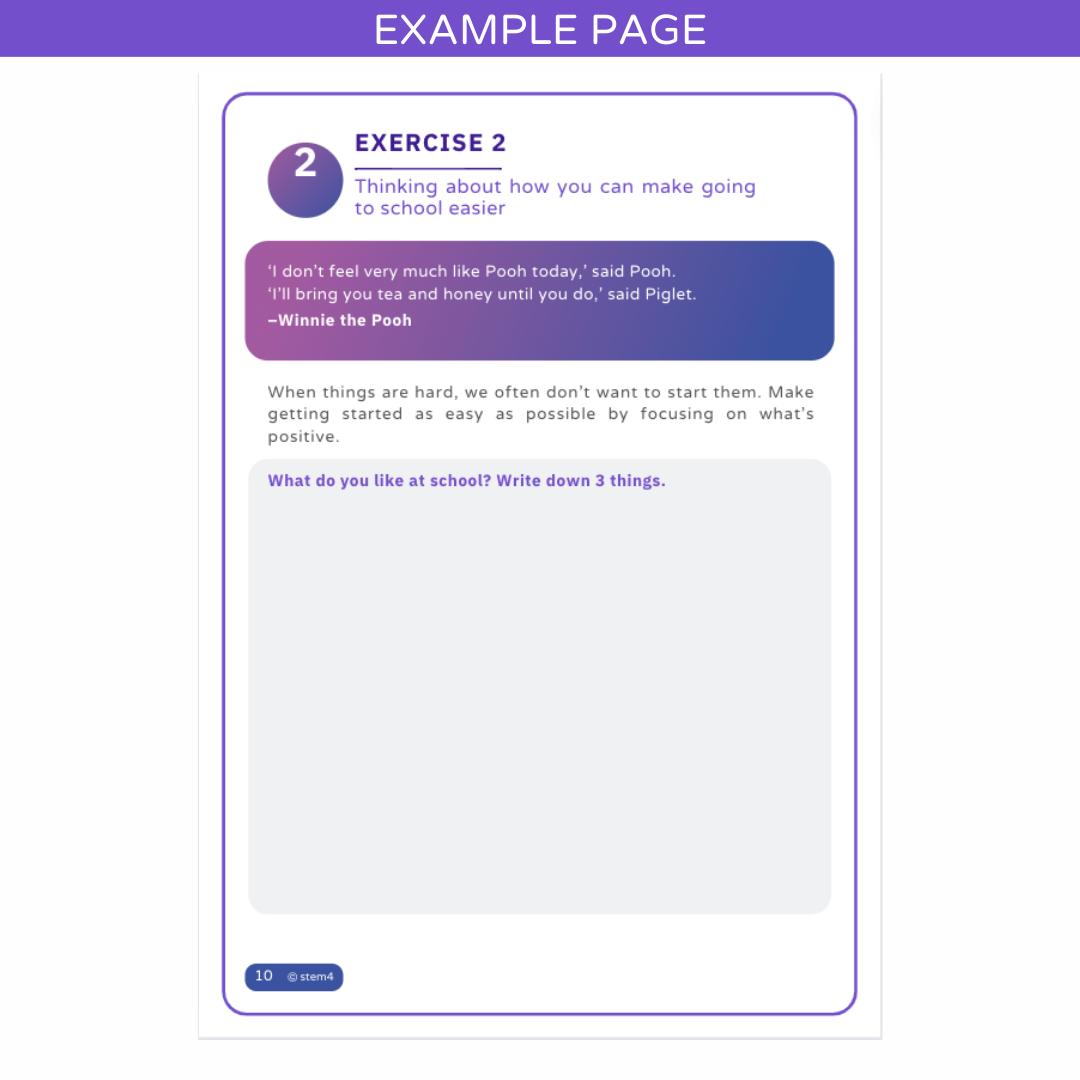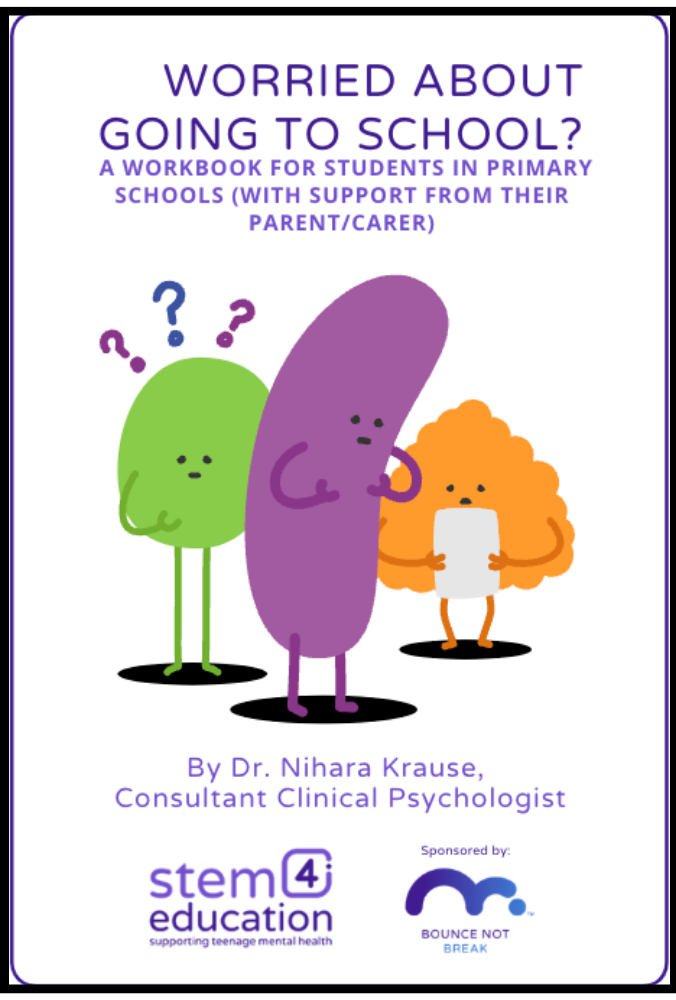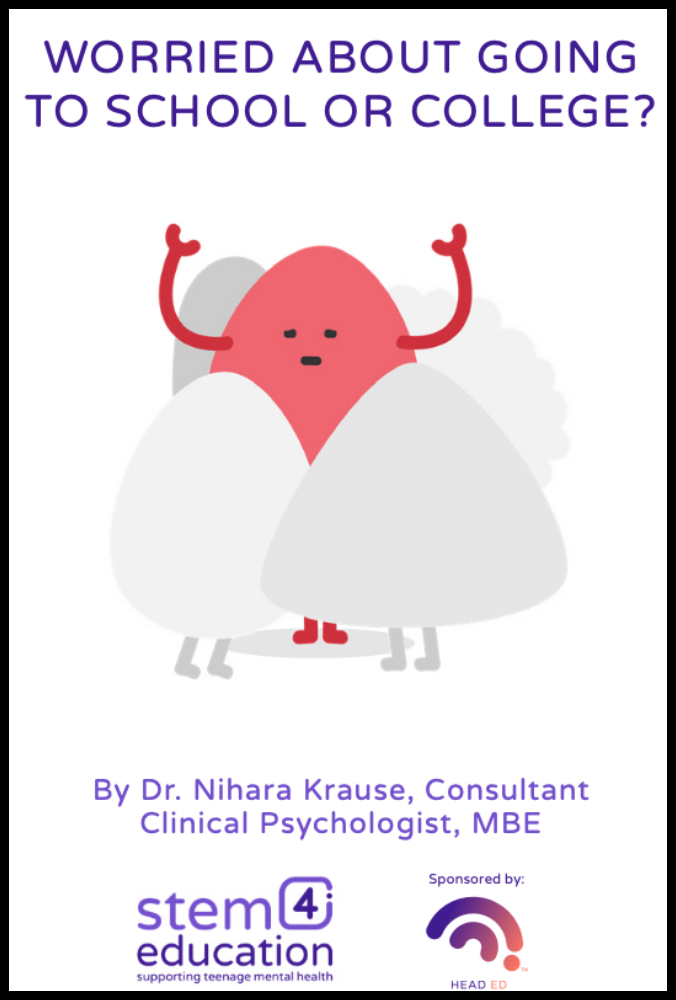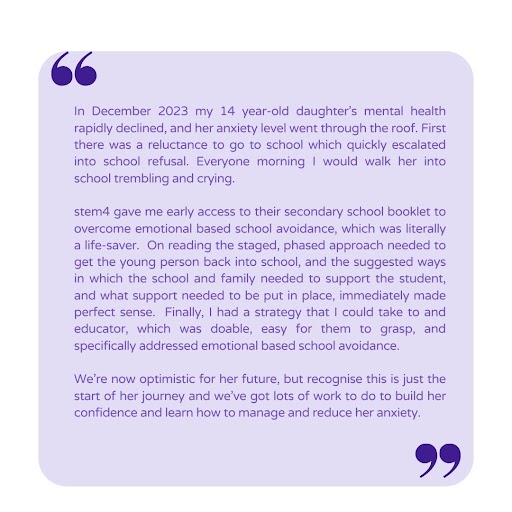

Emotionally Based School Avoidance
Anxiety about going to school
Children and young people can feel anxious about going to school or college for many reasons. Sometimes the anxiety that’s felt can be so high that it can get in the way of going to school or college at all.
This is called Emotionally Based School Avoidance (EBSA).

Like most anxiety disorders, EBSA can be successfully treated by a form of psychological treatment called Cognitive Behavioural Therapy (CBT). This model teaches a child or young person who is anxious to identify the reasons for their anxiety and find alternative ways to deal with it, learn to challenge negative thoughts and face their fear of going to school one small step at a time.
For Parents, Carers and Schools
stem4 conducted a survey of 1,025 young people in the UK and found that 3 in 10 young people are avoiding school, college or university due to their mental health.
Analysis of state school attendance rates by the FFT Datalab found that following the pandemic, cost of living crisis and rising rates of mental ill health amongst young people, the rates of unauthorised absences have doubled since 2019. Similarly, a survey conducted by Unite Students found that ⅓ of students hoping to go to university in September 2023 have experienced disruptions to their education due to their mental health. 14% of the 37,000 young people surveyed said they had missed up to 20 days of education due to mental health struggles. This rate increased for students who were neurodivergent or had a disability.
Of the 1,025 children and young people surveyed, four in ten (41%) say “it’s better to avoid anxiety-provoking situations than to learn how to tackle and overcome my fears.” Of the young people surveyed by stem4, a substantial majority (84%) of 12-21 year olds say that over the past 12 months they have avoided situations that make them feel anxious and uncomfortable. These include public speaking (40%), talking to people they don’t know (35%), going to school, college, university or work (29%), making new friends (26%) and even dating (19%).
About stem4 resources to tackle Emotionally Based School Avoidance
To tackle these growing challenges, Dr Nihara Krause MBE, Consultant Clinical Psychologist and stem4 CEO and Founder, has developed two workbooks for primary and secondary school aged children to tackle emotionally based school avoidance behaviour.
- ‘Worried about going to school?’ is a workbook for students in primary schools (with support from their parent/carer).
- ‘Worried about going to secondary school or college?’ is a workbook for young people in secondary education.
The workbook will guide you through steps you can take to help reduce worry and fear around going to school, as well as provide signposts.
Sometimes going to school can become tough and this can make every day a challenge. Parents, carers, and teachers (and even the young person experiencing it) might have a hard time trying to understand why going to school has become so difficult.
By working through this workbook, the blocks to getting to school may become clear. Trying some of the activities, with guidance from a parent/carer, together with the Clear Fear app, will hopefully make being at school a little easier. There are also some suggestions on steps that can be taken to get further support and help.
A peek inside the booklet
‘Worried about going to school? and ‘Worried about going to secondary school?’ is available in paperback.
- Exploring and understanding why going to school might be hard
- Psychological, evidence-based exercises to make school easier
- Techniques for managing worries and fears
- Tailored for the individual needs of primary and secondary education students




About the author
Dr. Nihara Krause MBE founded stem4 based on the knowledge that early identification and intervention made a real difference in stemming what has recently been reported to be escalating teenage mental health conditions in their often serious and long-lasting course.
Nihara has many years of clinical experience working in a variety of mental health settings with both young people and adults. She has specialist experience in eating disorders and self-harm. Nihara is also a university lecturer, works extensively with the media, and has input in informing government on youth matters. She has a special interest in building resilience, as well as practicing effective treatment techniques for a variety of psychological problems. Nihara is the clinician who developed the award-winning Calm Harm, Clear Fear, Move Mood, and Combined Minds apps for stem4.
Most recently, Nihara developed the Worth Warrior app, stem4’s latest app which helps manage low self-worth and body dissatisfaction leading to eating difficulties.




